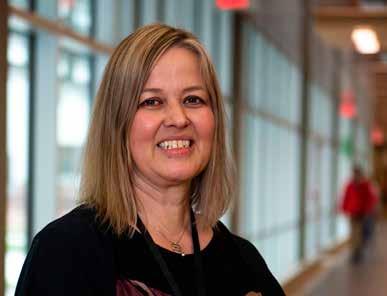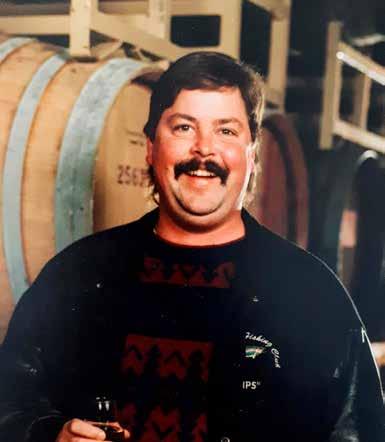
8 minute read
Every Moment Matters
THE FUTURE OF STROKE CARE IN THE SOUTHERN INTERIOR
Chances are you know someone. Nearly everyone does. A parent, neighbour, spouse, family member or friend. Someone who was just living their life. Then suddenly, everything changed. Maybe you always thought that not surviving a stroke was the worst outcome. Until you learned first-hand, how stroke can devastate the lives of all in it’s wake.
Advertisement

The Impact of Stroke
A stroke is an abrupt loss of brain function caused by a sudden brain blood vessel blockage or rupture. Although prevalence rises sharply after age 55, it can happen at any age.
Last year in British Columbia, there were over 1,800 cases of stroke in the Interior Health region. The numbers increase by 10% every year. The grim reality is that stroke is still the leading cause of longterm disability in adults and the third leading cause of death in B.C.
The impact of stroke is devastating. For patients and for those who love them.
Every Moment Matters
Advancement in research and treatment in recent years is making it possible for more and more patients to survive and recover from stroke. Rapid access to advanced, life-saving medical techniques within the established therapeutic window of care can measurably and significantly improve outcomes.
Immediate transport to a hospital offering advanced stroke services is critical. The challenge of geography in the southern interior of B.C. is significant. Those living in rural and remote areas of the region are extremely vulnerable.
With every minute that slips away, nearly 2 million brain cells die. That’s 32,000 cells in a second. The Time is Right
As the population centre for Interior Health and the leading referral hospital for over 1 million residents living in B.C., KGH is currently the only hospital outside of Victoria and the Lower Mainland to offer an advanced level of stroke care which is so vital to the health of the region.
This spring, the KGH Foundation will publicly announce what many are calling a ‘game-changer’ campaign – a call to raise $8 million to support radical advancements in regional stroke care for the southern interior. The ambitious plan aims to transform access, treatment and outcomes for stroke patients even in the most rural and remote locations in the interior of B.C. And, most importantly, save lives.
There has never been a better time. The need for advanced stroke care close to home is growing and Interior Health’s Stroke Care Network, with KGH as its hub, has never been stronger.
LEADERSHIP IN STROKE CARE
A comprehensive plan for Interior Health Patients and Families.
Acquiring the most advanced equipment and improving access to specialist care for all patients in Interior Health is paramount to advancing stroke care in the region. Donor support for this comprehensive plan will have impact on ALL stages of the stroke care continuum, from onset to rehabilitation, research and prevention.

ACUTE CARE

Advanced Neuro-Interventional Equipment
Restoring blood flow to the brain is the cornerstone of therapy for patients with a clot blocking blood flow. Funding the equipment and clinical space for the implementation of Endovascular Thrombectomy Neuro-interventional service (EVT), the new standard of care for acute ischemic stroke, at Kelowna General Hospital is fundamental. COMMUNITY CARE
Stroke Telehealth
Interior Health is fast becoming an industry leader in remote telehealth, an exciting field that allows rural patients to access world-class physicians, specialists and diagnostics from their home communities. The stroke campaign aims to fund the expansion of telehealth service throughout the southern interior.

QUALITY OF CARE

Caregivers & Advanced Rehabilitation
Funding will support the on-site development of skills and protocols relating to stroke management and community reintegration. The proposed KGH Centre of Excellence for Upper Limb Recovery Post Neurologic Injury will improve access to rehabilitation services for stoke patients, as well as other brain injuries and diseases. RESEARCH & INNOVATION KGH Foundation’s Stroke Innovation Fund
This fund will support research projects and initiatives and equipment aimed at reducing the impact of stroke for those living in the Interior Health region, in particular, rural, remote and First Nations communities.
The Interior Health Stroke Network

Dr. Aleksander Tkach
Vascular Neurology KGH, Medical Director for the IH Stroke Network and EVT Service
Cory Bendall
Network and EVT Service Director
Dr. Nevin de Korompay
Interventional Radiologist, KGH, President of the KGH Physicians Society


EVT is an advanced procedure in which neurologists pull a blood clot out of a stroke patient’s artery to restore blood flow to the brain. If administered within the ideal therapeutic treatment window (four to six hours), a good outcome results in a near reversal of disability in a stroke patient.
The Interior Health Stroke Network was established in October 2019 in response to the region’s growing need for coordinated diagnostics, urgent and hospital care, rehabilitation and community initiatives for stroke patients across the region, including in the most rural and remote locations.
In 2017, Interior Health recruited two leading stroke neurologists, Dr. Aleksander Tkach and Dr. Elsadig Elamin, who have lead the standardization of protocols and documentation for acute care, which has since expanded to include assessment, neurology rounds, quality improvement, and service planning.
In 2019, tertiary stroke units were established across the Interior Health region and although the equipment must still be funded, Endovascular Thrombectomy (EVT) service began at Kelowna General Hosptial. Working in partnership with donors, the community and the IH Stroke Network, the campaign will fund EVT procedures at KGH and provide the necessary supports for rural and remote patients to better access care. Funding will also catalyze the recruitment of specialists and the expansion of stroke unit care, rehabilitation, and provide enhanced tele-neurology for rural access to specialist care. It will allow the IH Stroke Network to continue its focus on building therapeutic and research connections provincially, nationally, and internationally.
Finally, and most critically, the campaign will change the face of stroke care in the southern interior region, saving lives and building futures that might never have been possible without it.

EVERY MOMENT MATTERS
When every moment matters, we can be ready. Every smile. Every step. Every second. Together we can reduce the devastating impact of stroke.
Learn more at kghfoundation.com/ways-to-give
Every Moment Matters Mark & Rachel’s Story

Rachel Skinner
It was a sunny, summer day in August 2020. Mark Skinner, a healthy, 49-year-old husband and father to two children was driving his excavator at work in Sparwood, B.C. when suddenly, he began to feel “off”. His face started to droop. His brain was not connecting with his body. Remarkably he recognized that he was having a stroke.
Upon arrival at Sparwood Primary Care, Mark’s situation was assessed and he was immediately transported to the East Kootenay Hospital in Cranbrook, where a CT scan confirmed that he had indeed suffered a stroke. Mark was rushed by air ambulance to Kelowna General Hospital where he received an Endovascular Thrombectomy (EVT) – a life-saving neuro-interventional procedure to treat an acute ischemic stroke.
When Mark’s wife, Rachel, learned that he had suffered a stroke, she could not comprehend how her husband could be faced with this, “I thought that stroke only happened to elderly people, not someone 49, active and healthy,” she recalls. Mark’s stroke came with no known warning signs and threw a curveball at this vibrant family. Mark survived the stroke and the EVT procedure successfully removed the clot from his brain. But it was just the beginning.
Mark would spend the next two months at KGH in recovery and rehabilitation. He worked hard during physical therapy. The emotional fall-out of his stroke took its toll. He wanted to go home, see his kids, his dog, sleep in his own bed. He became increasingly frustrated with the fact that although his mind knew what he wanted to do, his body was having difficulties performing even the most-simple of tasks.
In cases of stroke, the impact on family members can be overwhelming. “This has been the hardest thing we have ever gone through”, shares Rachel emotionally. “Our world had been flipped upside down.”
Mark’s neurologist at KGH, Dr. Aleksander Tkach, is also Interior Health’s Medical Director of Stroke Care. While the Skinners are grateful for the outstanding care Mark received during his stroke and in the months following, Dr. Tkach is passionate that more can be done to help improve treatment for patients living in the interior of B.C.
“We have a good standard of care, but our goal is world-class care for patients in the interior,” says Dr. Tkach. “Medical advancements are making it possible for more patients to survive and recover from stroke. In addition to acquiring the most advanced equipment to treat stroke, we also need funding to support research and innovation, while improving access for all patients in Interior Health.”
Nearly eight weeks after suffering his lifealtering stroke, and with a long road still ahead, Mark was released from KGH and returned home to Sparwood.
“Every day is a gift”, says Rachel. “In a health crisis it really is true… every moment does matter.”





